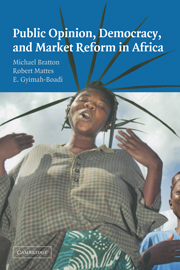Book contents
- Frontmatter
- Contents
- List of Tables and Figures
- Acknowledgments
- Introduction
- PART I FRAMEWORK
- PART II POPULAR ATTITUDES TO REFORM
- PART III COMPETING EXPLANATIONS
- PART IV EXPLAINING REFORM CONSTITUENCIES
- 11 Modeling Attitudes to Reform
- 12 Predicting Political Participation
- 13 Deciphering Regime Consolidation
- Conclusions
- Appendices
- Notes
- Index
- Cambridge Studies in Comparative Politics
12 - Predicting Political Participation
Published online by Cambridge University Press: 15 December 2009
- Frontmatter
- Contents
- List of Tables and Figures
- Acknowledgments
- Introduction
- PART I FRAMEWORK
- PART II POPULAR ATTITUDES TO REFORM
- PART III COMPETING EXPLANATIONS
- PART IV EXPLAINING REFORM CONSTITUENCIES
- 11 Modeling Attitudes to Reform
- 12 Predicting Political Participation
- 13 Deciphering Regime Consolidation
- Conclusions
- Appendices
- Notes
- Index
- Cambridge Studies in Comparative Politics
Summary
We have argued that, far from emanating from the deep structures and cultures of African societies, public opinion about liberalization springs mainly from recent political and economic learning. Mass attitudes about regime changes are primarily the product of acquired knowledge and instrumental calculation. But a critic might reasonably interject: “so what?” Does it really matter what ordinary Africans think and feel about public affairs? Don't the prospects for democratization and economic reform depend more critically on what these actors actually do? Surely public opinion can only be taken seriously if attitudes are converted into action?
We happen to think that attitude change is central to processes of regime consolidation and thus is worth studying in its own right. But, to address valid concerns about practical consequences, this chapter explores whether attitude change results in active citizenship. The focus is on political participation in all its variegated dimensions, from voting and protesting to what we all have called communing and contacting. These topics were broached earlier. On the extent of participation, we showed that the Africans we interviewed are politically busy during elections but less so between elections (see Chapter 5). Yet we found that people who contact their leaders and engage in collective action are also early adopters of democratic and market reforms (see Chapter 10). In this chapter we search for the underlying determinants of political participation and try to settle whether such behaviors are best regarded as a cause or an effect of reform.
- Type
- Chapter
- Information
- Public Opinion, Democracy, and Market Reform in Africa , pp. 295 - 314Publisher: Cambridge University PressPrint publication year: 2004

